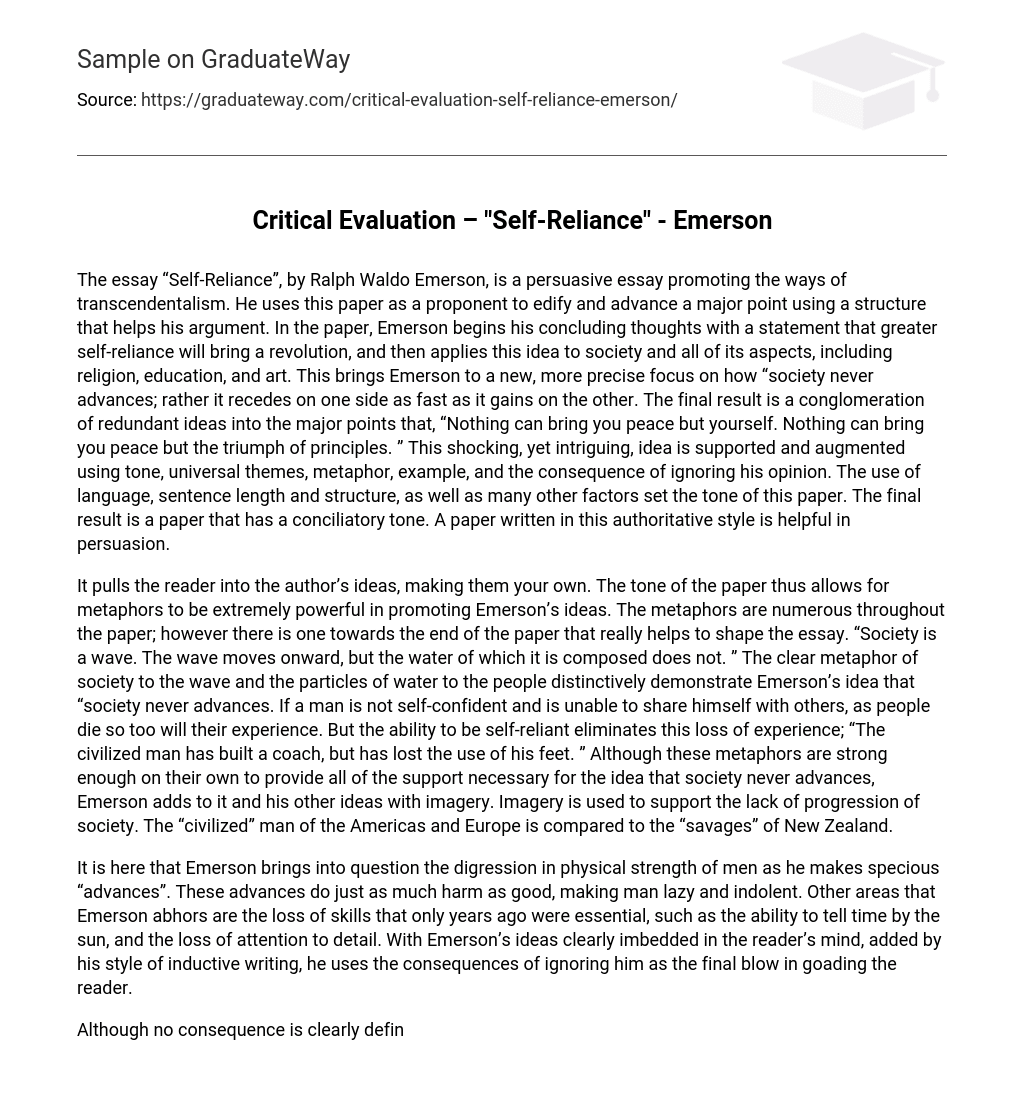The essay “Self-Reliance”, by Ralph Waldo Emerson, is a persuasive essay promoting the ways of transcendentalism. He uses this paper as a proponent to edify and advance a major point using a structure that helps his argument. In the paper, Emerson begins his concluding thoughts with a statement that greater self-reliance will bring a revolution, and then applies this idea to society and all of its aspects, including religion, education, and art. This brings Emerson to a new, more precise focus on how “society never advances; rather it recedes on one side as fast as it gains on the other. The final result is a conglomeration of redundant ideas into the major points that, “Nothing can bring you peace but yourself. Nothing can bring you peace but the triumph of principles. ” This shocking, yet intriguing, idea is supported and augmented using tone, universal themes, metaphor, example, and the consequence of ignoring his opinion. The use of language, sentence length and structure, as well as many other factors set the tone of this paper. The final result is a paper that has a conciliatory tone. A paper written in this authoritative style is helpful in persuasion.
It pulls the reader into the author’s ideas, making them your own. The tone of the paper thus allows for metaphors to be extremely powerful in promoting Emerson’s ideas. The metaphors are numerous throughout the paper; however there is one towards the end of the paper that really helps to shape the essay. “Society is a wave. The wave moves onward, but the water of which it is composed does not. ” The clear metaphor of society to the wave and the particles of water to the people distinctively demonstrate Emerson’s idea that “society never advances. If a man is not self-confident and is unable to share himself with others, as people die so too will their experience. But the ability to be self-reliant eliminates this loss of experience; “The civilized man has built a coach, but has lost the use of his feet. ” Although these metaphors are strong enough on their own to provide all of the support necessary for the idea that society never advances, Emerson adds to it and his other ideas with imagery. Imagery is used to support the lack of progression of society. The “civilized” man of the Americas and Europe is compared to the “savages” of New Zealand.
It is here that Emerson brings into question the digression in physical strength of men as he makes specious “advances”. These advances do just as much harm as good, making man lazy and indolent. Other areas that Emerson abhors are the loss of skills that only years ago were essential, such as the ability to tell time by the sun, and the loss of attention to detail. With Emerson’s ideas clearly imbedded in the reader’s mind, added by his style of inductive writing, he uses the consequences of ignoring him as the final blow in goading the reader.
Although no consequence is clearly defined, Emerson has made it more than clear what will happen if people do not become more individualistic. “Trust thyself: every heart vibrates to that iron string. “ Here Emerson urges his readers to retain the outspokenness of a small child who freely speaks his mind because he has not yet been corrupted by adults who tell him to do otherwise. He also urges readers to avoid envying or imitating others viewed as models of perfection; instead, he says, readers should take pride in their own individuality and never be afraid to express their own original ideas.
In addition, he says, “whoso would be a man must be a nonconformist. ” Emerson believes individuals should refuse to succumb to the ways of the popular culture and its shallow ideals; rather they should live up to their own ideals, even if doing so castigates them denigration and denunciation. Society will stay as it is, no matter how many technological advances are made. This fear of being no better nor advanced than previous eras is the most powerful motivator for change of all. Emerson’s challenge to not rely on fortune, rather to make things happen for one’s self is exactly what he wants it to be: motivational and persuasive.
The promotion of transcendentalism in Emerson’s essay “Self-Reliance” is the encouragement of people living in a better way. The structural support of aplomb in “Self-Reliance” through tone, universal themes, metaphor, example, and the consequence of ignoring Emerson’s opinion achieves the goal of persuasion. This produces the final result of a vote for independence, telling that “what I must do is all that concerns me, not what the people think. ” The promise of the transcendentalist of personal peace with the achievement of self-reliance would be nothing more than an inane idea without Emerson’s ability to structure and support his idea.





